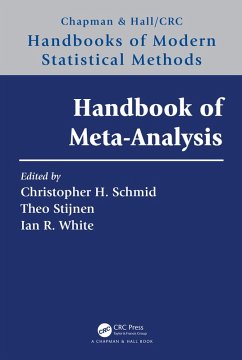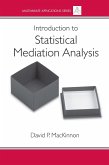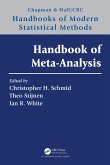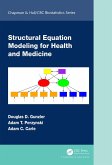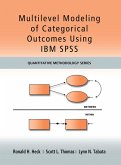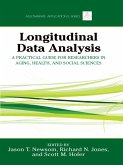Handbook of Meta-Analysis (eBook, ePUB)
Redaktion: Schmid, Christopher H.; White, Ian; Stijnen, Theo
64,95 €
64,95 €
inkl. MwSt.
Sofort per Download lieferbar

32 °P sammeln
64,95 €
Als Download kaufen

64,95 €
inkl. MwSt.
Sofort per Download lieferbar

32 °P sammeln
Jetzt verschenken
Alle Infos zum eBook verschenken
64,95 €
inkl. MwSt.
Sofort per Download lieferbar
Alle Infos zum eBook verschenken

32 °P sammeln
Handbook of Meta-Analysis (eBook, ePUB)
Redaktion: Schmid, Christopher H.; White, Ian; Stijnen, Theo
- Format: ePub
- Merkliste
- Auf die Merkliste
- Bewerten Bewerten
- Teilen
- Produkt teilen
- Produkterinnerung
- Produkterinnerung

Bitte loggen Sie sich zunächst in Ihr Kundenkonto ein oder registrieren Sie sich bei
bücher.de, um das eBook-Abo tolino select nutzen zu können.
Hier können Sie sich einloggen
Hier können Sie sich einloggen
Sie sind bereits eingeloggt. Klicken Sie auf 2. tolino select Abo, um fortzufahren.

Bitte loggen Sie sich zunächst in Ihr Kundenkonto ein oder registrieren Sie sich bei bücher.de, um das eBook-Abo tolino select nutzen zu können.
Meta-analysis is the application of statistics to combine results from multiple studies and draw appropriate inferences. Its use and importance have exploded over the years as the need for a robust evidence base has become clear in many scientific areas like medicine and health, social sciences, education, psychology, ecology and economics.
- Geräte: eReader
- ohne Kopierschutz
- eBook Hilfe
- Größe: 14.87MB
Andere Kunden interessierten sich auch für
![Measuring Society (eBook, ePUB) Measuring Society (eBook, ePUB)]() Chaitra H. NagarajaMeasuring Society (eBook, ePUB)27,95 €
Chaitra H. NagarajaMeasuring Society (eBook, ePUB)27,95 €![Introduction to Statistical Mediation Analysis (eBook, ePUB) Introduction to Statistical Mediation Analysis (eBook, ePUB)]() David MackinnonIntroduction to Statistical Mediation Analysis (eBook, ePUB)54,95 €
David MackinnonIntroduction to Statistical Mediation Analysis (eBook, ePUB)54,95 €![Handbook of Meta-Analysis (eBook, PDF) Handbook of Meta-Analysis (eBook, PDF)]() Handbook of Meta-Analysis (eBook, PDF)64,95 €
Handbook of Meta-Analysis (eBook, PDF)64,95 €![Structural Equation Modeling for Health and Medicine (eBook, ePUB) Structural Equation Modeling for Health and Medicine (eBook, ePUB)]() Douglas D. GunzlerStructural Equation Modeling for Health and Medicine (eBook, ePUB)46,95 €
Douglas D. GunzlerStructural Equation Modeling for Health and Medicine (eBook, ePUB)46,95 €![Multilevel Modeling of Categorical Outcomes Using IBM SPSS (eBook, ePUB) Multilevel Modeling of Categorical Outcomes Using IBM SPSS (eBook, ePUB)]() Ronald H HeckMultilevel Modeling of Categorical Outcomes Using IBM SPSS (eBook, ePUB)50,95 €
Ronald H HeckMultilevel Modeling of Categorical Outcomes Using IBM SPSS (eBook, ePUB)50,95 €![Statistical Methods for Modeling Human Dynamics (eBook, ePUB) Statistical Methods for Modeling Human Dynamics (eBook, ePUB)]() Statistical Methods for Modeling Human Dynamics (eBook, ePUB)52,95 €
Statistical Methods for Modeling Human Dynamics (eBook, ePUB)52,95 €![Longitudinal Data Analysis (eBook, ePUB) Longitudinal Data Analysis (eBook, ePUB)]() Longitudinal Data Analysis (eBook, ePUB)56,95 €
Longitudinal Data Analysis (eBook, ePUB)56,95 €-
-
-
Meta-analysis is the application of statistics to combine results from multiple studies and draw appropriate inferences. Its use and importance have exploded over the years as the need for a robust evidence base has become clear in many scientific areas like medicine and health, social sciences, education, psychology, ecology and economics.
Dieser Download kann aus rechtlichen Gründen nur mit Rechnungsadresse in A, B, BG, CY, CZ, D, DK, EW, E, FIN, F, GR, HR, H, IRL, I, LT, L, LR, M, NL, PL, P, R, S, SLO, SK ausgeliefert werden.
Produktdetails
- Produktdetails
- Verlag: Taylor & Francis eBooks
- Seitenzahl: 570
- Erscheinungstermin: 7. September 2020
- Englisch
- ISBN-13: 9781351645713
- Artikelnr.: 60031913
- Verlag: Taylor & Francis eBooks
- Seitenzahl: 570
- Erscheinungstermin: 7. September 2020
- Englisch
- ISBN-13: 9781351645713
- Artikelnr.: 60031913
- Herstellerkennzeichnung Die Herstellerinformationen sind derzeit nicht verfügbar.
Christopher Schmid Christopher H. Schmid is Professor of Biostatistics at Brown University. He received his BA in Mathematics from Haverford College in 1983 and his PhD in Statistics from Harvard University in 1991. In 1991, he joined the Institute for Clinical Research and Health Policy Studies at Tufts Medical Center and joined the medical faculty at Tufts University in 1992. He became the director of the Biostatistics Research Center in 2006 and Associate Director of the Tufts Clinical and Translational Research training program in 2009. In 2012, he moved to Brown University to co-found the Center for Evidence Synthesis in Health. In 2016, he became Director of the Clinical Study Design, Epidemiology and Biostatistics Core of the Rhode Island Center to Advance Translational Science and in 2018 became Chair of Biostatistics in the School of Public Health. Dr. Schmid has a long record of collaborative research and training activities in many different clinical and public health research areas. His research focuses on Bayesian methods for meta-analysis, including networks of treatments and N-of-1 designs, as well as open-source software tools, as well as methods for developing and assessing predictive models using data from multiple databases, e.g., the current standard biomarker prediction tool for GFR, glomerular filtration rate. He is the author of nearly 300 publications, including coauthored consensus CONSORT reporting guidelines for N-of-1 trials and single-case designs, and PRISMA guidelines extensions for meta-analysis of individual participant studies and for network meta-analyses as well as the Institute of Medicine report that established US standards for systematic reviews. Dr. Schmid is an elected member of the Society for Research Synthesis Methodology and co-founding editor of its journal, Research Synthesis Methods. He is a Fellow of the American Statistical Association and long-time statistical editor of the American Journal of Kidney Diseases. Ian White Ian White is Professor of Statistical Methods for Medicine at the Medical Research Council Clinical Trials Unit at University College London, UK. He originally studied mathematics at Cambridge University, and his first career was as a teacher of mathematics in The Gambia, Cambridge and London. He obtained his MSc in statistics from University College London, where he subsequently worked in the Department of Epidemiology and Public Health. He was then Senior Lecturer in the Medical Statistics Unit at the London School of Hygiene and Tropical Medicine and for 16 years programme leader at the Medical Research Council Biostatistics Unit in Cambridge. He received his PhD by publication in 2011. His research interests are in statistical methods for the design and analysis of clinical trials, observational studies and meta-analyses. He is particularly interested in developing methods for handling missing data, correcting for departures from randomised treatment, novel trial designs, simulation studies, and network meta-analysis. He runs courses on various topics and has written a range of Stata software. Theo Stijnen Theo Stijnen is Emeritus Professor of Medical Statistics at the Leiden University Medical Center, The Netherlands. He obtained his MSc in mathematics at Leiden University in 1973 and received his PhD in mathematical statistics at the University of Utrecht in 1980. Then he decided to leave mathematical statistics and to specialise in applied medical statistics, a choice he has never regretted. In 1981 he was appointed assistant professor of medical statistics at the Leiden University Medical Faculty. In 1987 he became associate professor of biostatistics at the Erasmus University Medical Center in Rotterdam, where he was appointed full professor in 1998. In 2007 he returned to Leiden again to become the head of the Department of Medical Statistics and Bioinformatics, which was recently renamed the Department of Biomedical Data Sciences. He has a broad experience in teaching statistics to various audiences and his teaching specialties include mixed modelling, survival analysis, epidemiological modelling and meta-analysis. In 2009 he was a co-founder of the MSc program Statistical Science for the Life and Behavioral Sciences, the first MSc program in this field in The Netherlands. He has extensive experience in statistical consultancy for medical researchers, resulting in more than 400 co-authorships in the medical scientific literature, of which about 25 on medical meta-analyses. His biostatistical research interests include clinical trials methodology, epidemiological methods, mixed modelling and meta-analysis. He is (co-)author of over 70 methodological articles, of which about 25 on meta-analysis. He retired on December 14, 2016. He now works part-time as an independent biostatistical consultant and continues doing research.
1. Introduction to systematic review and meta-analysis
2. General themes in meta-analysis
3. Choice of effect measure and issues in extracting outcome data
4. Analysis of univariate study-level summary data using normal models
5. Exact likelihood methods for group-based summaries
6. Bayesian methods for meta-analysis
7. Meta-regression
8. Individual participant data meta-analysis
9. Multivariate meta-analysis
10. Network meta-analysis
11. Model Checking in meta-analysis
12. Handling internal and external biases: quality and relevance of studies
13. Publication and outcome reporting bias
14. Control risk regression
15. Multivariate meta-analysis of survival proportions
16. Meta-analysis of correlations, correlation matrices and their functions
17. The meta-analysis of genetic studies
18. Meta-analysis of dose-response relationships
19. Meta-analysis of diagnostic tests
20. Meta-analytic approach to evaluation of surrogate endpoints
21. Meta-analysis of epidemiological data, with a focus on individual
participant data
22. Meta-analysis of prediction models
23. Using meta-analysis to plan further research
2. General themes in meta-analysis
3. Choice of effect measure and issues in extracting outcome data
4. Analysis of univariate study-level summary data using normal models
5. Exact likelihood methods for group-based summaries
6. Bayesian methods for meta-analysis
7. Meta-regression
8. Individual participant data meta-analysis
9. Multivariate meta-analysis
10. Network meta-analysis
11. Model Checking in meta-analysis
12. Handling internal and external biases: quality and relevance of studies
13. Publication and outcome reporting bias
14. Control risk regression
15. Multivariate meta-analysis of survival proportions
16. Meta-analysis of correlations, correlation matrices and their functions
17. The meta-analysis of genetic studies
18. Meta-analysis of dose-response relationships
19. Meta-analysis of diagnostic tests
20. Meta-analytic approach to evaluation of surrogate endpoints
21. Meta-analysis of epidemiological data, with a focus on individual
participant data
22. Meta-analysis of prediction models
23. Using meta-analysis to plan further research
1. Introduction to systematic review and meta-analysis
2. General themes in meta-analysis
3. Choice of effect measure and issues in extracting outcome data
4. Analysis of univariate study-level summary data using normal models
5. Exact likelihood methods for group-based summaries
6. Bayesian methods for meta-analysis
7. Meta-regression
8. Individual participant data meta-analysis
9. Multivariate meta-analysis
10. Network meta-analysis
11. Model Checking in meta-analysis
12. Handling internal and external biases: quality and relevance of studies
13. Publication and outcome reporting bias
14. Control risk regression
15. Multivariate meta-analysis of survival proportions
16. Meta-analysis of correlations, correlation matrices and their functions
17. The meta-analysis of genetic studies
18. Meta-analysis of dose-response relationships
19. Meta-analysis of diagnostic tests
20. Meta-analytic approach to evaluation of surrogate endpoints
21. Meta-analysis of epidemiological data, with a focus on individual
participant data
22. Meta-analysis of prediction models
23. Using meta-analysis to plan further research
2. General themes in meta-analysis
3. Choice of effect measure and issues in extracting outcome data
4. Analysis of univariate study-level summary data using normal models
5. Exact likelihood methods for group-based summaries
6. Bayesian methods for meta-analysis
7. Meta-regression
8. Individual participant data meta-analysis
9. Multivariate meta-analysis
10. Network meta-analysis
11. Model Checking in meta-analysis
12. Handling internal and external biases: quality and relevance of studies
13. Publication and outcome reporting bias
14. Control risk regression
15. Multivariate meta-analysis of survival proportions
16. Meta-analysis of correlations, correlation matrices and their functions
17. The meta-analysis of genetic studies
18. Meta-analysis of dose-response relationships
19. Meta-analysis of diagnostic tests
20. Meta-analytic approach to evaluation of surrogate endpoints
21. Meta-analysis of epidemiological data, with a focus on individual
participant data
22. Meta-analysis of prediction models
23. Using meta-analysis to plan further research
